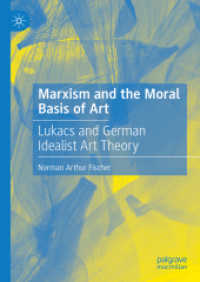- ホーム
- > 洋書
- > ドイツ書
- > Humanities, Arts & Music
- > Religion & Theology
Description
(Short description)
(Text)
At the end of the 10th / 16th century in Aleppo, a weaver, cloth merchant, and poet named Kamal al-Din would regularly take his time to fill blank pages with his varied observations. But it was not a linear narrative he produced, nor was it a diary. Rather, he scribbled down accounts on the political and social life of his city and the region; the climate; economic developments; his craft; poetry, much of it his own; anecdotes; reading excerpts; obituaries of dignitaries and friends; history. In doing so, Kamal al-Din upends assumptions about literary agency, faith, and class in the Ottoman Arab provinces and thus gives us insights rarely seen in other contemporary works.
Only a fragment of what once must have been a sizeable work survives, now preserved in the Forschungsbibliothek Schloss Friedenstein in Gotha under the shelfmark MS orient. A 114. It represents the earliest known Arabic notebook of an artisan or merchant.
(Author portrait)
Kristina Richardson, Queens College, New York, USA; Boris Liebrenz, Sächsische Akademie der Wissenschaften , Leipzig.






